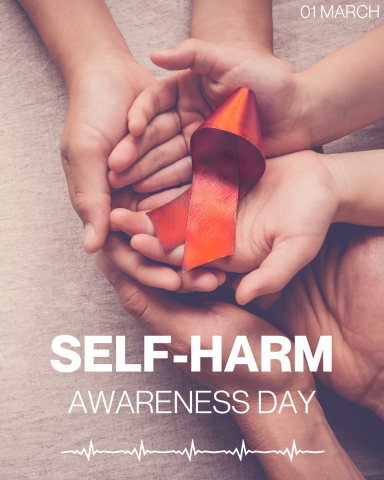Help and support available for anyone affected by self-harm

This Self-Harm Awareness Day [Saturday 1 March], the Public Health Agency (PHA) is encouraging people who are affected by self-harm, including families and carers, to reach out for help and support.
Raising awareness and encouraging people to start the conversation can help remove the stigma associated with self-harm and educate people on how to spot the signs, and importantly what next steps to take.
Self-harm is when someone hurts themselves intentionally as a way of coping with difficult feelings, painful memories, or overwhelming experiences and situations. Most people who self-harm do not intend to seriously harm themselves and do not want to die. However, it can become a serious problem and it should always be taken seriously and not dismissed. People who self-harm and their families are strongly encouraged to seek help and support.
Kathy Owens, Health and Social Wellbeing Improvement Manager, at the PHA, said: “There are various forms of self-harm. Sometimes it can be difficult to spot the signs and notice when someone is self-harming, as people who self-harm may try their best to hide it and keep it a secret from the those around them.
“If you think a friend or family member is self-harming, signs to look out for include unexplained cuts, bruises or burns on their body, keeping themselves fully covered even in hot weather, signs they have been pulling out their hair, changes in eating habits and any unusual changes to weight. You may also notice other signs that they are struggling with their mental health such as low mood or misusing alcohol or drugs.”
People who self-harm will often think it is the only way for them to manage distressing feelings. If you feel the urge to self-harm, try to distract yourself until the urge has passed. Things which may help distract you include:
- spending time with people you care about or pets;
- exercising;
- spending time outdoors, around nature;
- listening to music;
- keeping yourself busy;
- practising meditating, mindfulness or breathing techniques;
- reading or journaling.
Kathy continued: “There are a number of services available to help and support people who self-harm, and their family and friends. Speak to your GP or other healthcare professional who can assess your situation and refer you to other services that can help you. It’s important for you to recognise that you need help and support to develop healthier coping skills to prevent further self-harm.
“You are not alone. There are services that can help you and won’t judge you. Services are confidential and experienced in dealing with self-harm. It’s very important that you take the first step, talk to someone today.”
A list of local services and resources including leaflets on “Improving the lives of those who self-harm” and “Self-harm family guide” are available at www.mindingyourhead.info
If you have done something to seriously harm yourself or are at risk of suicide, you should go to a hospital Emergency Department or call 999 if more urgent assistance is required.
If you, or someone you know, is in distress or despair, call Lifeline free on 0808 808 8000. Calls are free from all landlines and most mobiles. Calls to Lifeline are answered by trained counsellors who can provide help and support. Counsellors are experienced in dealing with self-harm, suicidal thoughts and many other issues. Lines are open 24 hours a day, seven days a week.
Textphone – 18001 808 8000 – can be accessed using the Relay UK App at www.relayuk.bt.com. British and Irish Sign Language users can also use the SignVideo app – http://signvideo.co.uk/hscni. If English is not your first or preferred language, Lifeline can access translators to speak to you in your preferred language.
